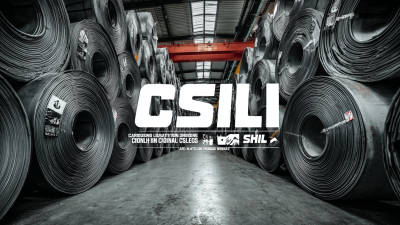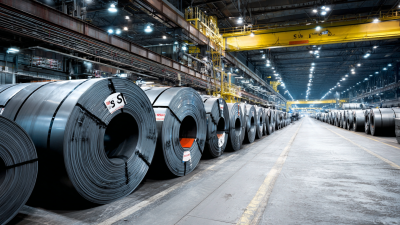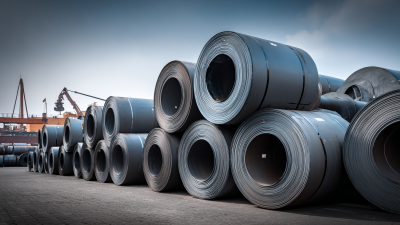The manufacturing landscape is continuously evolving, with materials playing a crucial role in driving innovations. Among these, Carbon Steel Mild Steel Coil has emerged as a staple in various industries due to its versatility, strength, and cost-effectiveness. According to a report by the Global Steel Industry Association, the demand for carbon steel products is expected to see a robust growth trajectory, reaching an estimated market value of $1 trillion by 2025, propelled by the construction and automotive sectors.

Experts emphasize the significance of Carbon Steel Mild Steel Coil in modern manufacturing. Dr. Emily Hawthorne, a leading materials engineer, states, “The adaptability and performance characteristics of Carbon Steel Mild Steel Coil make it indispensable in both structural and automotive applications, enhancing production efficiency.” This insight resonates across the industry, as manufacturers increasingly rely on these coils to produce everything from structural frameworks to intricate automotive components.
In summary, the benefits and applications of Carbon Steel Mild Steel Coil are vast, underpinning its crucial role in modern manufacturing processes. Understanding these advantages not only aids in material selection but also drives innovation and sustainability in production methodologies, fostering a more resilient and adaptable manufacturing environment.
Carbon steel mild steel coils are becoming increasingly popular in modern manufacturing due to their outstanding versatility and strength. These coils are often used in various industrial applications, from construction to automotive production. One of the primary benefits of carbon steel mild steel coils is their excellent weldability, which allows for seamless integration into many manufacturing processes. Additionally, they offer a favorable cost-to-performance ratio, making them an economic choice for industries looking to maintain quality while keeping costs down.
When working with carbon steel mild steel coils, it's important to consider the appropriate thickness and treatment for your specific application. Different manufacturing procedures may require varying levels of strength and flexibility, so always evaluate your project's needs carefully.
Tip: Ensure that your storage environment is controlled to prevent any corrosion over time. This can be crucial in maintaining the integrity and longevity of the steel coils in your projects. Another tip is to explore different surface finishes that can enhance durability and provide aesthetic appeal, which may be a decisive factor in product design and presentation.
Carbon steel mild steel coil is increasingly recognized for its versatility across various manufacturing processes. Its unique properties, such as high strength, formability, and weldability, make it an ideal choice for a wide range of applications, from automotive components to construction materials. According to recent market analysis, the global steel rebar market is projected to grow significantly, reaching a notable size by 2033, driven by demanding construction projects and infrastructural developments. This underscores the critical role of high-quality steel products, including mild steel coil, in meeting industry requirements.
In terms of applications, carbon steel mild steel coil proves indispensable in industries requiring durable and reliable materials. For instance, its adaptability in fabrication allows for efficient production methods, contributing to increased efficiency and reduced waste. Reports indicate that the rise in demand for lightweight and high-strength materials aligns with the growing preferences in manufacturing, particularly in automotive and heavy machinery sectors. As manufacturers seek to innovate and reduce costs, carbon steel mild steel coil continues to be a key player in driving advancements and meeting the challenges of modern production techniques.
Carbon steel mild steel coils have gained significant attention in modern manufacturing due to their cost-effectiveness and versatility. According to a recent industry report from MarketsandMarkets, the global demand for carbon steel is projected to reach 2.14 billion tons by 2025, driven by its applicability in various sectors, including automotive, construction, and consumer goods. The affordability of carbon steel mild steel coils makes them an attractive option for manufacturers looking to optimize production costs without compromising on quality.
One of the most significant advantages of using carbon steel mild steel coils is their excellent machinability and ductility, allowing manufacturers to fabricate components efficiently. A study by the American Iron and Steel Institute indicated that the use of mild steel can reduce overall material costs by up to 20% in comparison to alternative materials. This efficiency, combined with the material's strength, means manufacturers can produce durable products while minimizing waste and expenses.
Tips: When selecting carbon steel mild steel coils for production, consider the specific grade required for your application to ensure optimal performance. Moreover, exploring bulk purchasing options can further reduce costs, yielding savings that can be reinvested in other areas of the production process.
When comparing carbon steel mild steel coils to other materials like stainless steel and aluminum, several factors come into play, including cost, strength, and versatility. Carbon steel mild steel is renowned for its affordability and ease of fabrication, making it the preferred choice for many manufacturers. Unlike stainless steel, which is resistant to corrosion but more expensive, carbon steel mild steel coils provide a balance of performance and price, making them suitable for a wide range of applications such as automotive components and structural frameworks.
Moreover, while aluminum is lightweight and has excellent corrosion resistance, it cannot match the strength and durability offered by carbon steel mild steel coils. This versatility allows mild steel coils to be used in high-stress environments where robust performance is essential. Additionally, the ease of welding and machining carbon steel mild steel facilitates seamless integration into diverse manufacturing processes, thus maintaining their competitive edge over other materials.
The future trends in carbon steel mild steel coil usage in manufacturing are shaped significantly by market dynamics and innovation. The U.S. metal forging market, valued at $7.75 billion in 2022, is projected to grow at a compound annual growth rate (CAGR) of 6.1% during the forecast period. This growth is indicative of a broader embrace of low-carbon steel products, particularly in sectors such as construction and automotive, where sustainability and efficiency are increasingly prioritized. The global low-carbon steel market is categorized by product types—hot-rolled and cold-rolled steel—and application areas, signaling a tailored approach to meet the diverse needs of modern manufacturing.
Furthermore, despite challenges in the real estate sector, steel consumption remains resilient, exemplifying the industry's adaptability amidst economic fluctuations. Reports indicate that although new real estate projects have declined, the demand for steel products has not diminished, highlighting the robust nature of the steel market. Innovations like bio-based coatings for steel, aimed at supporting the green transformation of the steel industry, also point toward a future where carbon steel mild steel coils will play a crucial role in sustainable manufacturing practices. As industries pivot towards more sustainable solutions, the versatility and strength of carbon steel will ensure its relevance well into the next decade.
| Application | Benefits | Future Trends |
|---|---|---|
| Automotive Manufacturing | High ductility, low cost, and excellent weldability | Increased use in electric vehicle construction |
| Construction | Robust strength and resistance to deformation | Sustainability in building materials |
| Shipbuilding | Corrosion resistance and weld quality | Focus on eco-friendly ship designs |
| Appliances | Cost-effective and versatile material | Integration of smart technology in design |
| Manufacturing Equipment | Durability and ease of fabrication | Automation and robotics in production lines |











